#girls in uniform 1931
Explore tagged Tumblr posts
Text
Hi can somebody give me sapphic film recommendations? I want something new to watch and I am out of ideas
#sapphic#sapphic film#so the problem is I have watched a lot already...#d.e.b.s.#fried green tomatoes#fear street#fingersmith#the handmaiden#imagine me & you#carol#i can't think straight#the world unseen#loving annabelle#girls in uniform 1931#girls in uniform 1958#fucking amal#with every heartbeat#viola di mare#the children's hour#lost and delirious#saving face#mystere a la tour eiffel#Tipping the velvet#the night watch#disobedience#the miseducation of cameron post#but I'm a cheerleader#the intervention#heavenly creatures#Tags won't let me write more but this is only like less than half of the list lol
135 notes
·
View notes
Text




Mädchen in Uniform Directors Leontine Sagan • Carl Froelich
#Movie&TV#Mädchen in Uniform#Girls in Uniform#Girls in Uniform 1931#Mädchen in Uniform 1931#Hertha Thiele#Dorothea Wieck
46 notes
·
View notes
Text




#marlene dietrich#dorothea wieck#girls in uniform 1931#german cinema#1930s#girl things#im just a girl#hell is a teenage girl#old hollywood#old hollywod glamour
6 notes
·
View notes
Text










Mädchen in Uniform / Girls in Uniform Leontine Sagan, Carl Froelich. 1931
Opening Lustgarten, 14467 Potsdam, Germany See in map
See in imdb
#leontine sagan#carl froelich#mädchen in uniform#girls in uniform#potsdam#germany#ringerkolonnade#brandenburg#movie#cinema#film#location#google maps#street view#1931
20 notes
·
View notes
Text

#mädchen in uniform#1931#classic cinema#classic film#classic hollywood#old hollywood#old hollywood film#leontine sagan#mädchen in uniform (1931)#girls in uniform#girls in uniform (1931)#lesbian#lesbian cinema#film stills#movie caps
11 notes
·
View notes
Text
A Comprehensive List of Pre-21st Century Lesbian Films
There seems to be a lot of interest in older/more niche films with lesbian themes so I've been putting together this list. I'm going to keep adding to it as I find more films so feel free to let me know if I'm missing anything! Enjoy!
Quick disclaimer: Some of these films contain problematic elements such as racism, homophobia, sexism and so on. This list is not an endorsement of all these films, it is only for archival purposes. As I have not seen all these films I cannot provide accurate content warnings, so please do your own research before watching.
1880 - 1919
The Kiss (1882), Dir. Eadweard Muybridge [SHORT, SILENT, ZOOPRAXISCOPE]
Pierrette’s Escapades (1900), Dir. Alice Guy [SHORT, SILENT, HAND TINTED]
At the Floral Ball (1900), Dir. Alice Guy [SHORT, SILENT, HAND TINTED]
Midwife to the Upper Class (1902), Dir. Alice Guy [SHORT, SILENT, COMEDY]
The Jester’s Joke (1910), Dir. Walter R. Booth [SHORT, SILENT, COMEDY]
Zapata’s Gang (1914), Dir. Urban Gad [SILENT, CRIME, COMEDY]
Filibus (1915), Dir. Mario Roncoroni [SILENT, HEIST, ACTION]
1920-1939
Manslaughter (1922), Dir. Cecil B. Demil [SILENT, DRAMA]
The Girl in Tails (1926), Dir. Karin Swanstrom [SILENT, COMEDY]
Wings (1927), Dir. William A. Wellman [SILENT, WAR, ACTION]
Pandora’s Box (1929), Dir. G.W. Pabst [SILENT, DRAMA]
Diary of a Lost Girl (1929), Dir. G.W. Pabst [SILENT, DRAMA]
Morocco (1930), Dir. Josef von Sternberg [DRAMA, ROMANCE]
Mädchen in Uniform (1931), Dir. Leontine Sagan [DRAMA, COMING OF AGE]
Queen Christina (1933), Dir. Rouben Mamoulian [DRAMA, PERIOD]
Fukujuso (1935), Dir. Jiro Kawate [SILENT, DRAMA]
The Tomboy (1936), Dir. Jean de Limur [DRAMA]
Girls’ Club (1936), Dir. Jacques Deval [COMEDY, CRIME]
1940-1959
Jenny Lamour (1947), Dir. Henri-Georges Clouzot [CRIME, DRAMA]
Thirst (1949), Dir. Ingmar Bergman [DRAMA]
Caged (1950), Dir. John Cromwell [DRAMA]
Girl with Hyacinths (1950), Dir. Hasse Ekman [MYSTERY, NOIR]
Olivia (1951), Dir. Jacqueline Audry [DRAMA]
No Exit (1954), Dir. Jacqueline Audry [DRAMA]
La Garçonne (1957), Dir. Jacqueline Audry [DRAMA]
The Twilight Girls (1957), Dir. Andre Hunebelle [COMEDY, DRAMA]
Mädchen in Uniform (1958), Dir. Geza von Radvanyi [DRAMA, COMING OF AGE, REMAKE]
1960-1969
Blood and Roses (1960), Dir. Roger Vadim [VAMPIRE, HORROR, EROTIC]
Léon Morin, Priest (1961), Dir. Jean-Pierre Melville [DRAMA]
The Girl with the Golden Eyes (1961) Dir. Jean-Gabriel Albicocco [DRAMA]
The Children’s Hour (1961), Dir. WIlliam Wyler [DRAMA]
Walk on the Wild Side (1962), Dir. Edward Dymitrik [DRAMA]
Manji (1964), Dir. Yasuzo Masumura [DRAMA]
With Beauty and Sorrow (1965), Dir. Masahiro Shinoda [DRAMA]
Faster, Pussycat! Kill! Kill! (1965), Dir. Russ Meyer [EXPLOITATION]
Daisies (1966), Dir. Věra Chytilová [AVANT GARDE, COMEDY, DRAMA]
The Group (1966), Dir. Sidney Lumet [DRAMA]
La Religieuse (1966), Dir. Jacques Rivette [DRAMA]
Persona (1966), Dir. Ingmar Bergman [AVANT GARDE, PSYCHOLOGICAL, DRAMA]
Belle De Jour (1967), Dir. Luis Bunuel [DRAMA]
The Fox (1967), Dir. Mark Rydell [DRAMA]
Les Biches (1968), Dir. Clauthde Chabrol [DRAMA, EROTIC]
The Killing of Sister George (1968), Dir. Robert Aldrich [DRAMA, EXPLOITATION]
Therese and Isabelle (1968), Dir. Radley Metzger [ROMANCE, DRAMA, EROTIC]
The Girl from Pussycat (1969), Dir. Smythe David [SEXPLOITATION]
Check to the Queen (1969), Dir. Pasquale Festa Campanile [DRAMA, EROTIC]
The Others (1969), Dir. Renzo Maietto [DRAMA]
1970-1979
Valerie and Her Week of Wonders (1970), Dir. Jaromil Jires [AVANT GARDE, DRAMA, COMING OF AGE]
Beyond the Valley of the Dolls (1970), Dir. Russ Meyer [COMEDY, MUSICAL, MELODRAMA]
Midnight Virgin (1970), Dir. Shogoro Nishimura [DRAMA, EROTIC]
The Conformist (1970), Dir. Bernardo Bertolucci [POLITICAL DRAMA]
Multiple Maniacs (1970), Dir. John Waters [COMEDY]
The Dark Side of Tomorrow (1970), Dir. Jack Deerson, Barbara Peeters [DRAMA]
Nightmares Come at Night (1970), Dir. Jesús Franco [DRAMA]
The Vampire Lovers (1970), Dir. Roy Ward Baker [VAMPIRE, HORROR, EROTIC]
The Shiver of the Vampires (1971), Dir. Jean Rollin [VAMPIRE, EROTIC]
Girl Slaves of Morgana Le Fay (1971), Dir. Bruno Gantillon [EROTIC]
Daughters of Darkness (1971), Dir. Harry Kumel [VAMPIRE, EROTIC]
Vampyros Lesbos (1971), Dir. Jesús Franco [VAMPIRE, EXPLOITATION, EROTIC]
Daughter of Dracula (1972), Dir. Jesús Franco [VAMPIRE, EROTIC]
Intimate Confessions of a Chinese Courtesan (1972), Dir. Chor Yuen [MARTIAL ARTS, DRAMA, EROTIC]
The Bitter Tears of Petra von Kant (1972), Dir. Rainer Werner Fassbinder [DRAMA]
The Beguines (1972), Dir. Guy Casaril [DRAMA, EROTIC]
Don Juan or If Don Juan Were a Woman (1973), Dir. Roger Vadim [DRAMA, EROTIC]
Lemora: A Child’s Tale of the Supernatural (1974), Dir. Richard Blackburn [HORROR, COMING OF AGE]
Vampyres (1974), Dir. Jose Ramon Larraz [VAMPIRE, EXPLOITATION, EROTIC]
Foxy Brown (1974), Dir. Jack Hill [BLAXPLOITATION, ACTION]
Je Tu Il Elle (1974), Dir. Chantal Ackerman [DRAMA]
Black Emanuelle (1975), Dir. Bitto Albertini [SEXPLOITATION]
Successive Slidings of Pleasure (1974), Dir. Alain Robbe-Grillet [HORROR, AVANT GARDE, EROTIC]
Picnic At Hanging Rock (1975), Dir. Peter Weir [MYSTERY, DRAMA]
Word Is Out: Stories of Some of Our Lives (1977), Dir. Mariposa Film Group, et. al [DOCUMENTARY]
Bilitis (1977), Dir. David Hamilton [EROTIC]
Alucarda (1977), Dir. Juan López Moctezuma [VAMPIRE, HORROR, EXPLOITATION]
Fascination (1979), Dir. Jean Rollin [VAMPIRE, HORROR, EROTIC]
See Here My Love (1979), Dir. Hugo Santiago [MYSTERY, DRAMA]
1980-1989
Simone Barbes or Virtue (1980), Dir. Marie-Claude Treilhou [DRAMA]
Personal Best (1982), Dir. Robert Towne [SPORTS, DRAMA]
Scrubbers (1982), Dir. Mai Zetterling [DRAMA]
The Living Dead Girl (1982), Dir. Jean Rollin [ZOMBIE, HORROR]
Audience (1982), Dir. Barbara Hammer [DOCUMENTARY]
The Hunger (1983), Dir. Tony Scott [VAMPIRE]
Lianna (1983), Dir. John Sayles [DRAMA]
La Pirate (1984), Dir. Jacques Doillon [DRAMA]
Desert Hearts (1985), Dir. Donna Deitch [ROMANCE, DRAMA]
Anne Trister (1986), Dir. Lea Pool [DRAMA]
Kamikaze Hearts (1986), Dir. Juliet Bashore [DOCUFICTION]
Working Girls (1986), Dir. Lizzie Borden [DRAMA]
I’ve Heard the Mermaids Singing (1987), Dir. Patricia Rozema [COMEDY]
No No Nooky T.V. (1987), Dir. Barbara Hammer [COMEDY, SHORT]
1990-1999
The Company of Strangers (1990) Dir. Cynthia Scott [DOCUFICTION]
Salmonberries (1991), Dir. Percy Adlon [DRAMA]
Thelma & Louise (1991), Dir. Ridley Scott [CRIME, DRAMA]
Twin Peaks: Fire Walk with Me (1992), Dir. David Lynch [HORROR, AVANT GARDE]
Nitrate Kisses (1992), Dir. Barbara Hammer [DOCUMENTARY]
Flaming Ears (1992), Dir. A. Hans Scheirl, Dietmar Schipek, and Ursula Pürrer [AVANT GARDE, SCI-FI]
Fresh Kill (1994), Dir. Shu Lea Cheang [SCI-FI, AVANT GARDE]
Heavenly Creatures (1994), Dir. Peter Jackson [CRIME, THRILLER, BIOPIC]
Go Fish (1994), Dir. Rose Troche [COMEDY, DRAMA, ROMANCE]
The Maidens of Heavenly Mountains (1994), Dir. Andy Chin Wing-Keung [WUXIA]
The Celluloid Closet (1995), Dir. Rob Epstein & Jeffrey Friedman [DOCUMENTARY]
The Incredibly True Adventure of Two Girls in Love (1995), Dir. Maria Maggenti [COMEDY, DRAMA]
When Night is Falling (1995), Dir. Patricia Rozema [DRAMA]
BloodSisters: Leather, Dykes, and Sadomasochism (1995), Dir. Michelle Handelman [DOCUMENTARY]
Bound (1996), Dir. The Wachowskis [CRIME, THRILLER]
The Watermelon Woman (1996), Dir. Cheryl Dunye [ROMANCE, DRAMA, COMEDY]
Irma Vep (1996), Dir. Olivier Assayas [DRAMA]
Nowhere (1997), Dir. Gregg Araki [BLACK COMEDY, DRAMA]
Gia (1998), Dir. Michael Cristopher [BIOPIC]
High Art (1998), Dir. Lisa Cholodenko [DRAMA]
Election (1999), Dir. Alexander Payne [COMEDY]
Being John Malkovich (1999), Dir. Spike Jonze [COMEDY, FANTASY]
But I’m A Cheerleader (1999), Dir. Jamie Babbit [ROMANCE, COMEDY]
Adolescence of Utena (1999), Dir. Kunihiko Ikuhara [ANIME, DRAMA, COMING OF AGE]
#lesbian#wlw#dykeposting#sapphic#lesbian history#lesbian art#lesbian film#lgbt history#lgbt film#gay film#compilation#silent film#early lesbian film#film history#archival
488 notes
·
View notes
Text
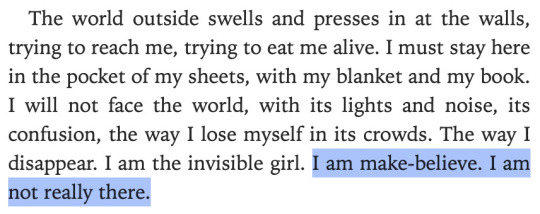
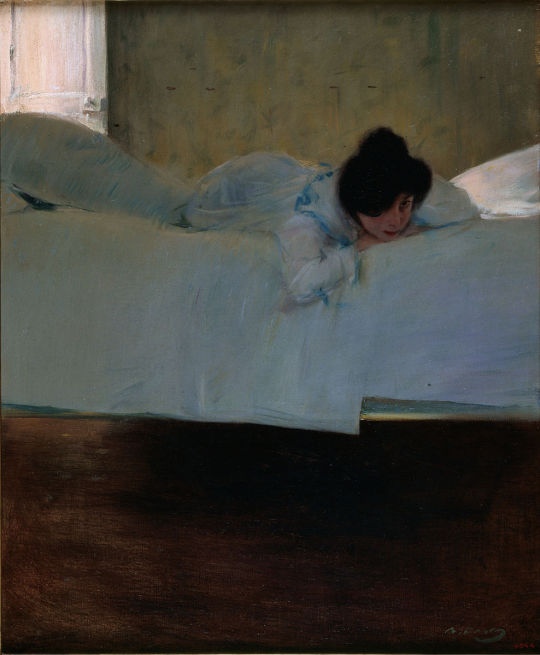

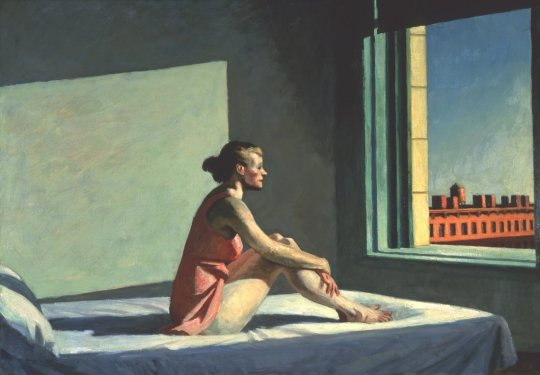






I am not really there
Marya Hornbacher, Madness: A Bipolar Life /// Ramon Casas, Laziness, c1898-1900 /// Sylvia Plath, The Bell Jar /// Edward Hopper, Morning Sun, 1952 /// Gail Honeyman, Elinor Oliphant is Completely Fine /// Reynier Llanes, The Poet, 2021 /// Anaïs Nin, The Diary of Anaïs Nin, 1931–1934 /// Amy Dury, Glasgow Girl 2, 2019 /// Rebecca Ross, Divine Rivals /// Adrienne Gaha, Blue Uniform, 2016
#web weaving#dissociation#burn out#autism#time blindness#pathological demand avoidance#<this is PDA to me just because dissociation is my main coping mechanism for demands. idk if others relate#poetry#poem#literature#art#painting#web weave
250 notes
·
View notes
Text

Good post op.
For those interested, here are some such films to know herstory:
"Mädchen in Uniform" (1931)
"Anna and Elizabeth" (1933)
"All about Eve" (1950)
"Olivia" (1951)
"Mädchen in Uniform" (1951), dir. Géza von Radványi
"Girls in Uniform" (1951), dir. Alfredo B. Crevenna
"No Exit" (1954)
"The Girl with the Golden Eyes" (1961)
"Walk on the Wild Side" (1962)
"The Nun" (1966)
"Persona" (1966) (yes, I'm including it)
"Belle de Jour" (1967)
"Les Biches" (1968)
"The Killing of Sister George" (1968)
"Baby Love" (1969)"
"The Exquisite Cadaver" (1969)
"The Vampire Lovers" (1970)
"Daughters of Darkness" (1971)
"The Bitter Tears of Petra von Kant" (1972)
"The Beguines" (1972)
"Successive Slidings of Pleasure" (1974)
"Twice a Woman" (1979)
"Desert Hearts" (1985)
"I’ve Heard the Mermaids Singing" (1987)
"Betty" (1992)
"Les Voleurs" (1996)
"8 Women" (2002)
"Nathalie…" (2003)
"Night Fangs" (2005)
"Backstage" (2005)
"Pretty Persuasion" (2005)
"Loving Annabelle" (2006)
"The Page Turner" (2006)
"Notes on a Scandal" (2006)
"Bandaged" (2009)
"Chloe" (2009), American remake of "Nathalie…"
"Cracks" (2009)
"Gigola" (2010)
"Bloomington" (2010)
"A Perfect Ending" (2012)
"Concussion" (2013)
"Nymphomaniac: Vol. II" (2013) (going controversial with this one)
"Tru Love" (2013)
"Clouds of Sils Maria" (2014)
"Sand Dollars" (2014)
"The Duke of Burgundy" (2014)
"Unexpected" (2014)
"4.48" (2014)
"Carol" (2015)
"Freeheld" (2015)
"Summertime" (2015)
"AWOL" (2016), dir. Deb Shoval
"Bird of Prey" (2016)
"Foreign Body" (2016)
"Allure" (2017)
"Atomic Blonde" (2017)
"Daphne du Maurier: In Rebecca’s Footsteps" (2017)
"The Party" (2017)
"You, Me and Him" (2017)
"Lizzie" (2018)
"The Favourite" (2018)
"Suspiria" (2018)
"The Bisexual" (2018)
"Clementine" (2019)
"Greta" (2019) (anon's* choice ❤️)
"Saint Maud" (2019)
"Ammonite" (2020)
"I Care a Lot" (2020)
"T11 Incomplete" (2020)
"Take Me Home" (2020)
"Parallel Mothers" (2021)
"Vigil" (2021)
"Benedetta" (2021)
"Anaïs in love" (2021)
"Eileen" (2023)
"May December" (2023)
Some of them are subtextual, some of them explicit, some--to use Tumblr's favorite word--problematique, some do not revolve around romance, some are cinematic masterpieces, some utter trash.
*Edit:

Ok, I laughed out loud, but on second thought? #valid
#should i go ~controversial and add 'may december' (2023)? it is persona coded and todd haynes knows what he's doing#films#list#there are some that do not fit here because not every age difference is a gap (see mulholland drive)#and others like 'Miss Viborg' and 'Starlet' that are not really what people are looking for
151 notes
·
View notes
Text
APPRECIATION POST
ELVIS AND THE BLUE MOON BOYS: As told by Scotty Moore.


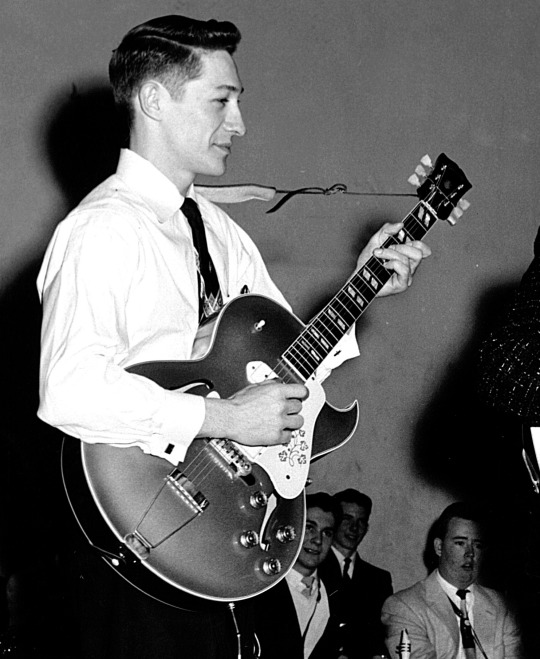
On a December 27th SCOTTY MOORE was born.🎈 I'm a little late but I wanted to celebrate this special month and date still in 2024. So here's a little summarized story, from Scotty's POV, of how it all started to happen in the music industry for him, Elvis, Bill and D.J,, our dear Blue Moon Boys. The story of how Rock and Roll music was born when initially three young men formed a trio in mid-1954.
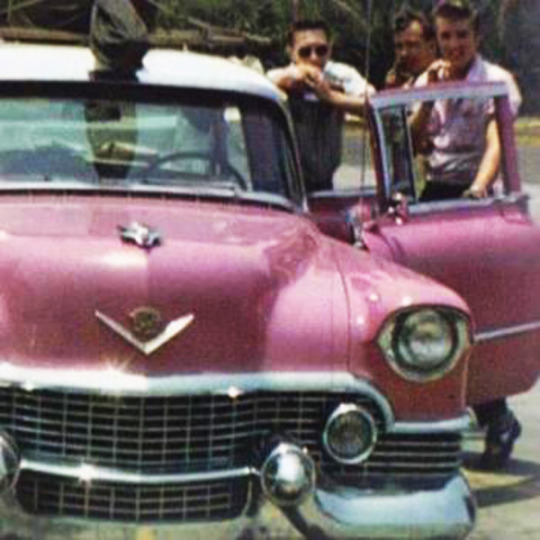
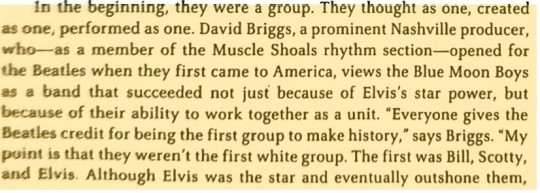

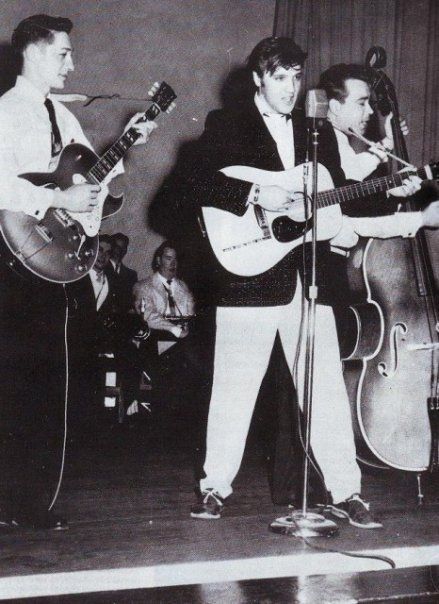
I must begin with an observation: "That's Alright, Elvis: The Untold Story of Elvis' First Guitarist and Manager, Scotty Moore" by Scotty Moore as told to James L. Dickerson, from where this excerpt above comes from, is a GREAT book! A definite Elvis and Rock and Roll music fans "must read." I'm yet to read Bill Black's story in "Don't Be Cruel, Elvis: The Bill Black Story" by Paul F. Belard and DJ Fontana's memoir book ("D.J. Fontana remembers Elvis")... but I'm taking my time enjoying Scotty's book for now. It's full of details and I'm impressed with each little part of his (their) story in those pages. People are not usually that interested in musicians as much as in the lead singers, specially if they're not musicians themselves, like me - but Scotty Moore had a very interesting life, besides the book is so well written, honest and fun you can't seriously feel it's even close to being uninteresting. Reading Scotty's book I never had the feeling of wanting to skip the story to the part where Elvis comes into the picture because Scotty's own story is that incredible! I mean it. Anyhow, I'm just sharing how much reading Scotty Moore's story was so important to me and made me feel a deeper appreciation for the Rock and Roll history as a whole and also it helped me better understanding Elvis as a person and how he came to be the legendary artist he became. I didn't finish the book yet, but I can tell from where I am in my readin that having Scotty, Bill and D.J.'s support, guidance and friendship was crucial to the rise of Elvis Presley as we know.

For the record, it actually started with Scotty Moore chasing his dream, cutting a record at the Memphis Recording Service and being asked to audition Presley afterwards. To think Scotty wasn't even supposed to be born! Haha... we'll get to that.


PICTURES: Three-months and five-years old Scotty Moore.
Winfield Scott Moore III (December 27, 1931 – June 28, 2016) was fond of music since he was a child. One of Scotty's bigger brothers gave him his guitar as a farewell gift when Scotty was five years old and his brother, Ralph, the youngest son in the family prior to Scotty being born, joined the US Navy (picture 1 is Scotty wearing a Navy uniform his brother sent him while he was serving). Scotty Moore had four siblings, three boys and a girl. In ascending order of age, they were Carney, Mildred Lee, Edwin and Ralph. His sister, Mildred, sadly passed away when she was only fourteen years old and Scotty wasn't even born yet. It was a hard time for the Moore family, but that sad event in their story was the reason why Scotty existed. Scotty's father, Winfield Scott Moore, found relief for his grief in music, playing fiddle and the banjo, instruments he taught himself how to play. Later he would teach his children how to play guitar. His mother, on the other hand, never got over losing her only girl. Scotty's brothers were born respectively in 1911, 1913, 1915 and 1917. Mildred, born in 1913, died in 1928. A couple of years later, Mattie Moore, Scotty's mother was already thirty-eight years old while her husband and Scotty's father was forty. Regardless of their age, she was so inconsolable over losing her only girl child, they decided to have another baby, hoping for another girl. That's when Scotty was born, in 1931. Scotty laughed when sharing this story. His parents never treated him as if he was a mistake, always showed him the same love they had for all the other children. However, being born with a huge gap regarding the other children in the family (Scotty's brothers were already 20, 16 and 14 when he was born), was not that easy. He felt left out simply because his siblings were in different moments in life than he was. Growing up as the only children in their household possibly contributed a lot to Scotty's relatively reserved, cautious, sober but highly creative personality.

The Moore family — L-R: Edwin, Scott (father), Carney, Ralph, Mattie (mother) and Scotty.
Given the circumstances surrounding his family, as the Great Depression hit hard, Scotty and his brothers grew up watching his father playing music in square dances and parties to help supplement the family's income. Eventually all the boys were involved with music, joining their father in a family band and playing together to help making ends meet. Like them, Scotty grew to love music but found in his guitar more than a way to unwind or to make a few bucks, he actually got serious over playing music and eventually went to dedicating most of his free time to improve his guitar skills.

"Scotty wanted to go fast. He wanted to play music you could dance to. It was as if there was some yet undefined, an inner rhythm simmering inside him, something wild and raw trying to break out into the light of day."
Excerpt "That's Alright, Elvis: The Untold Story of Elvis' First Guitarist and Manager, Scotty Moore" by Scotty Moore as told to James L. Dickerson.

Growing up, Scotty did not find his vocation in school. In his words, he "didn't dig" the school, being an average student. He dropped school for one year after completing the ninth grade, dedicating his time working in the family's farm, but not enjoying the work decided to go back to finish his high school education. In January 1948 Scotty followed his older siblings' steps and decided to enlist in the U.S. Navy. He was only sixteen at the time — the minimum age to join the Navy was eighteen or seventeen, with parent's permission. Therefore, Scotty had to lie about his age. He was lucky his father was supportive. According to Scotty, that was the only time his father lied, to help him. At the age of sixteen, Scotty Moore was a Navy man, still he never left his guitar aside. During his time in the Navy, Scotty formed different bands. One of them even had a fifteen-minute radio show on radio station KPRO in Bremington, Washington, and also played at clubs and parties off-base.

"When he played song the way they were written, they somehow came out different - faster, more energetic. On the outside, Scotty was cool and collected, and shy country boy. On the inside, he was bubbling with emotion. Music was his release. No one had ever heard music the way Scotty heard it; no one had ever felt it the same way."
Excerpt "That's Alright, Elvis: The Untold Story of Elvis' First Guitarist and Manager, Scotty Moore" by Scotty Moore as told to James L. Dickerson.


PICTURE: (1) The USS LST-855, the first ship on which Scotty served in China, and its officers. (2) Later, Scotty served in Japan and Korea on board of the aircraft carrier USS Valley Forge. Picture shows Scotty (left) with musician friends on board of the USS Valley Forge.
Scotty had to become a man fast, the Navy training and his time serving were enough to achieve that. Still, when he returned home to Tennessee after being discharged from the Navy on December 4, 1952, with a China and a Korean service medals in his collections, he was still headset to make music his life and main source of income. By 1954, while he worked at common jobs to make a living, after all at the tender age of 23 he was already a former Navy man, married (then to Bobbie Walls, his second wife) and had two children from his first marriage (to Mary Durkee) he needed to support — Linda Moore, born in December 16, 1950 and Donald Moore, born also on December 16, but in 1952 — Scotty had been trying to gather musicians to play in his free time around Memphis and its neighborhood. Those musicians groups had many different formations, none in particular and no official band for a while. it was upsetting since Scotty took playing music seriously. He looked for musicians as passionate and dedicated to music as himself to form a band and, eventually, he would find those musicians who would encourage him to pursue his dream even further.
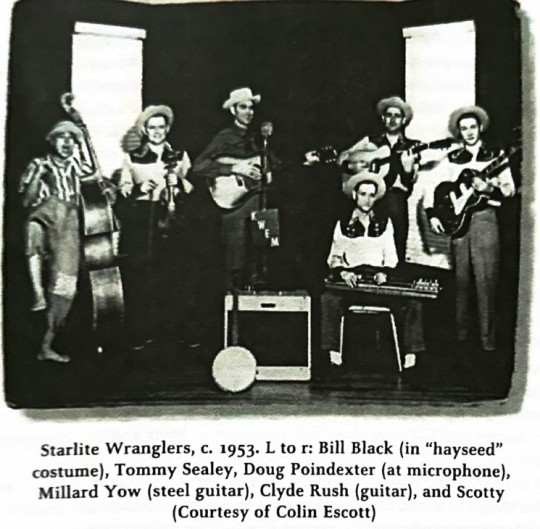
Scotty's first real band, a band he formed (under contract and all, quite unusual at that time for small bands) and to which he was the manager to, was the Starlite Wranglers — Lead vocals by Doug Poindexter, Bill Black on bass, Millard Yow on steel guitar, Clyde Rush on guitar and Thomas Sealy on fiddle. Just like Elvis but prior to him, Scotty did cut a record with his band at Sam Phillips' Memphis Recording Service facilities (Sun Records) in Memphis, Tennessee, in May 1954. That's how he got acquainted with Sam. The songs they recorded were "My Kind Of Carryin' On" (A-Side) and "Now She Cares No More For Me" (B-Side).
youtube
However, the Starlite Wranglers did not succeed as Scotty hoped for. Still, he continue to perform live in small gigs with his band, concerts he would book himself. At that moment, it was enough satisfying that he had a band with a real record out but he wanted better, he needed more. Scotty continued to visit Sam Phillips at Sun Records, hoping the man could get him a better chance to succeed in the business next time around. One summer day in 1954, Scotty was asked by Sam Phillips to audition Elvis Presley for him, to find out if Elvis was worth his time, money and records producing skills, following the suggestion of Sun Record's secretary Marion Keisker, who had been chatting with Elvis back and forth since he got into the studio in July 1953 looking to cut a private record as a gift to his mom, as he said. Marion was enchanted by the young's man politeness and lovable personality but also with his persistence in making music his real job. Scotty, on the other hand, knew nothing about Elvis, had never seen him until that point. He decided to invite Bill Black to help him out with the audition at Scotty's home (983 Belz street, North Memphis), a house that shared the same neighborhood as Bill Black and his wife's home. It happened on a Sunday afternoon: July 4, 1954. That same day, after the audition, Scotty gave his approval to Sam Phillips and they all got together at Sun Records. That's when "That's All Right, Mama" a 1946 blues song originally recorded by Arthur "Big Boy" Crudup was covered... but at Elvis, Scotty and Bill's brand new style.


PICTURES: 1. Scotty Moore's home in 1954, at 983 Belz street in Memphis, TN. The street was renamed and now (as far as I know) it's the Eldridge street, North Memphis. 2. Bill Black's home at the same neighborhood (967 Belz street). Moore and Black were neighbors in mid-1954 after the Blacks (Bill and his wife Evelyn) told Scotty and his then wife, Bobbie, about a home available for rent there. They first auditioned Elvis in Scotty's home on July 4, 1954, according to Scotty "Elvis arrived shortly after noon." ••• Credits (pictures): Mike Freeman on Flickr, pictures taken on February 21, 2011. Additional info: Youtuber Billy from "Spa Guy" channel visited the address. Here's a video uploaded in 2017 that shows the sites: "Elvis Presley Audition Scotty & Bill."


Scotty had a long story with music of his own prior to Elvis coming into his life. He knew much more about the music industry than Elvis at that point when they met (mid-1954) and so did Bill Black, both already used to entertaining small audiences in honky tonks, which proved to be just what Elvis needed, jovial musicians with a passion for music as strong as his own, but people that could school him on the business.
The trio was a perfect match. Elvis' voice and the attention he got, the curious gazes from both youngsters and adults, interested not only in his voice but also in his flashy looks and unusual movements onstage, combined with Scotty's management skills and Bill's boldness to experiment with sounds and the great enthusiasm and energy he brought onstage, encouraging the rather shy young Elvis to let loose and show everyone his true self, was like the stars were finally aligned when those three met. When Elvis already had a deal with Sun Records and was finally a music artist as he dreamed of becoming, a member of the trio gathered by Sam Phillips to which Scotty Moore naturally took over the management responsibilities (in contract signed on July 12th, 1954 just a few days after Elvis' first audition with Bill and Scotty), due to his previous experience as a band manager. Initially, Scotty Moore was the only person actually booking gigs for them. The easiest way for Scotty to introduce his new band to the public was by incorporating the trio as "special guests" to the Starlite Wranglers shows. One of the sites they played at was the Bon Air Club, a bar at the outer rim of the city (Memphis) limits. That was before Elvis and The Moon Boys could even have a name, as it would be for a little while...

The group's name soon after would come. Taken from the B-side of "That's All Right, Mama", "Blue Moon of Kentucky," a Bill Monroe hit from 1946 that was recorded at Sun Records by Elvis and the boys just a couple of days afterwards, on July 6, 1954.
"With 'That's All Right, Mama,' Elvis took a blues song and sang it white. With 'Blue Moon of Kentucky' he did the opposite: he took a country song and gave it a bluesy spin."
Excerpt "That's Alright, Elvis: The Untold Story of Elvis' First Guitarist and Manager, Scotty Moore" by Scotty Moore as told to James L. Dickerson.
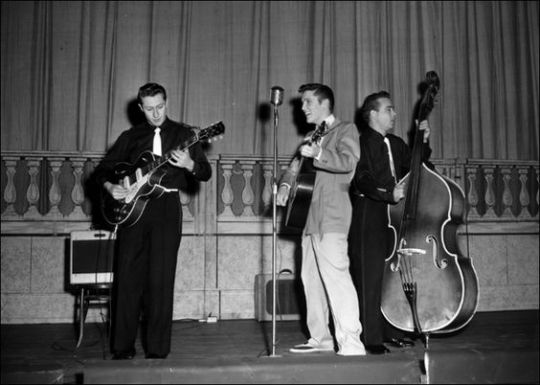
Already on the road, a little while afterwards the three added a drums player to the group, D.J. Fontana. They'd met and become friends during the Louisiana Hayride gigs, where D.J. was an in-house drummer on its Saturday night radio broadcast. Hidden behind the curtains onstage for a Louisiana Hayride performance of Elvis and the Blue Moon Boys, on October 16 1954 at the Municipal Auditorium in Shreveport, LA, D.J. had his first taste of what it was like to play with the boys. D.J. said about playing with them: "I figured the best thing for these guys was to stay out of the way, why would I clutter it up with cymbals? I'll just play the back beat and stay out of their way. They already had the good sound."
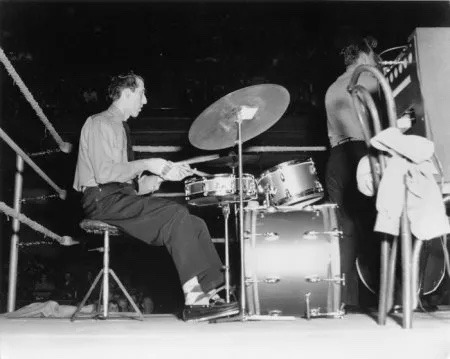

Scotty's management on Elvis' career didn't last long, tho. As a local musician with no connections in the business that could give the band a national break, Elvis' management contract was given to the deejay Bob Neal, a friend of Sam Phillips, and, not long afterwards, to Colonel Parker, who would take over Elvis' destiny from then on. Scotty shares in his book that the moment he talked to Parker he could feel Elvis and the Blue Moon Boys as they were was not far from becoming history. He wasn't wrong. but that's another story. The boys still had time to be featured in some of Elvis' most remarkable films released in the 50s, as "Jailhouse Rock" (1957), and definitely left an everlasting mark in music and a legacy that'll never be forgotten.

It was crazy being a musician for Elvis Presley, sure, but those three guys rocked and, IMHO, the Blue Moon Boys are the responsible ones for Elvis getting to be so demanding on hiring his musicians when he went back to performing live, in 1969, after the end of his Hollywood acting career and a hiatus from live performances that lasted seven years. At the beginnings, Scotty said there was a point [at the peak of the Elvis Mania in the 50s] where they couldn't hear any music during the concerts, so they had no option but to guide themselves by Elvis' moves onstage to get an idea of what part of the songs they were supposed to be playing. D.J. Fontana said he could hear the music but couldn't see the other musicians when he started playing with the boys. Elvis couldn't hear himself in most of the shows in the 50s, specially when things got bigger and wilder from 1956 on. Elvis was a perfectionist and he expected his musicians to follow his lead onstage. He would gesture to them whenever he wanted a change in the pace or sound... when to begin playing, when to pause, when to lower the music, when to come to an end. Elvis liked how intuitive, quick and responsive to him Scotty, Bill and D.J. were onstage, and that established his standard for what good live musicians were made of. Other than a perfectionist, Elvis was quite methodical character in work. He wasn't one to get easily convinced into changing his way of doing things if he liked the way they worked before. That's another great insight Scotty's book gives us. As the band was originally composed by three members, they didn't have a lot of instruments to fill the sound in records, so Sam Phillips decided to put Elvis' vocals at the same level as the instruments as he produced their records. Elvis liked how that sounded, so much so that he just hated when people (and I mean Colonel Parker) wanted to bring his vocals front and put the instruments more or less in the background, which happened in some of his later records. Colonel Parker reasoned with that saying Elvis' fans wanted to hear Elvis' voice, nothing more and Elvis didn't agree in the slightest. Other example of Elvis being resistant to changes in the music business was in 1969 at the American Sound studio, when the way of producing records was very different than in the 50s, being more common to tape the parts of the songs separately (backing vocals, instruments and leading vocals) because that gave a better opportunity to explore with the sounds to the music producers, allowing them to reach different sounds than recording songs with all of the musicians playing and singing together in the same room as in a live concert could give. Elvis had a little bit of a hard time accepting it. He loved how the 50s music was made. That, my friends, is how the Blue Moon Boys era and his experience recording at Sun Records was dear to the King's heart.
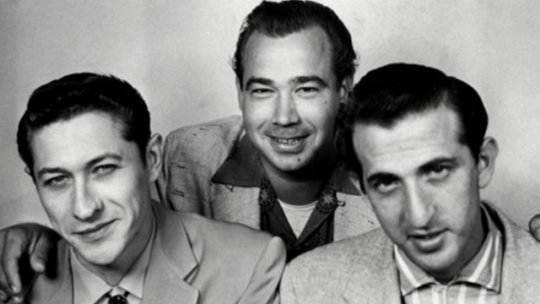
Well, not so full of dates and details but that's it. Just a summarized story of the beginnings of Rock and Roll music in the 50s. In Scotty's book it's all way more interesting, I guarantee you. The point is... those guys were a force of nature together. They were different, fresh, exciting... as a team. It was not only about the lead singer for a while. Scotty was quite shy and modest, yet very mature and serious over playing music, while Bill Black was fun and energetic onstage, giving Elvis the encouragement to act more wild and bold onstage too, little by little but quickly becoming as untamed as he could be, inspiring fear and frenzy into the "square" 50s society. EP learned a lot about how to be an exciting entertainer at that time.
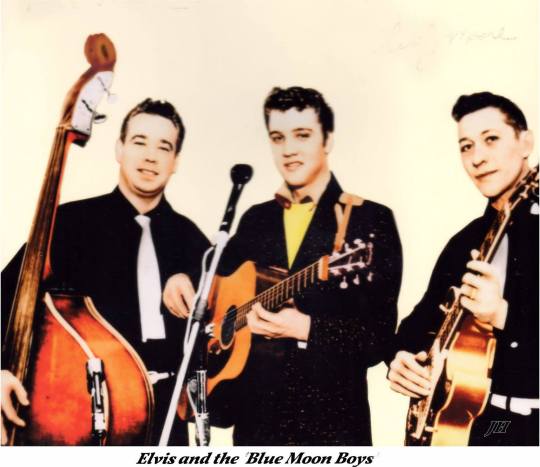
Scotty, Bill and DJ... I will always appreciate your efforts and dedication to music. You were extremely important, taught and guided Elvis while he was finding his way in the industry. Your place in history is permanent, and so is our gratitude. Don't be fooled, my friends, we still feel the direct impact Elvis and the Blue Moon Boys caused in the entertainment industry. They rocked our world.
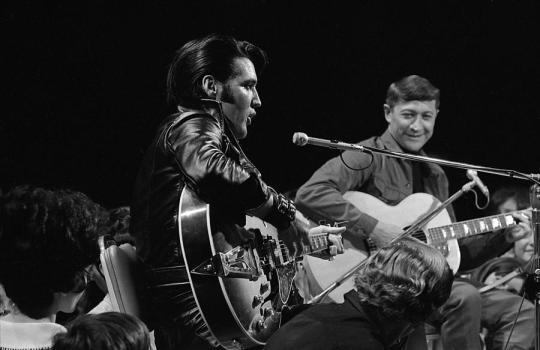
I specially will always appreciate Scotty Moore being stubborn on his passion with music. In a world where so many people are wannabes, so many try to make it and give up when things get rough and life happens, Scotty's vision and creativity helped change the course of music forever. It wasn't easy. Scotty, just like Elvis in a future time, lost his (first) wife - among other reasons - because of his music inclination. Scotty and Bill were a reflection of what Elvis was, if we take a closer look at their private lives. As I said before, they matched. It was meant to be.
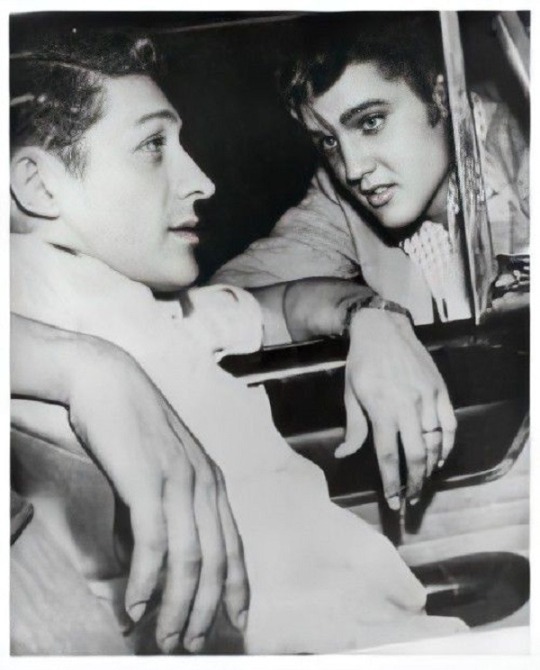
Happy heavenly belated birthday, Scotty. I hope I did justice sharing a little bit of your story. I am an admirer of your work. Even not knowing the least about music technicalities, I know enough to be certain your guitar playing talent inspired many great musicians that would come after you. Your story is unique and so special. I feel blessed knowing a little bit of who you were and how you felt. God bless your soul, dear Scotty. ♥
#I love Elvis and the Blue Moon Boys beyond words#that's one of the most special parts of Elvis Presley's career to me#elvis presley#elvis history#elvis music#elvis and the blue moon boys#scotty moore#bill black#dj fontana#elvis#50s elvis#50s music#rock and roll history#rock and roll hall of fame#elvis the king#Spotify
52 notes
·
View notes
Text

MAEDCHEN IN UNIFORM (1931) aka GIRLS IN UNIFORM, and M (1931)
21 notes
·
View notes
Note
The first explicitly lesbian film (PG-13) is Mädchen in Uniform (1931). It's based on real events of Christa Winsloe the writer. Cast: only women & girls. Greatly recommended both the film & Christa Winsloe. Poll: Have you watched Mädchen in Uniform (1931)?
youtube
66 notes
·
View notes
Text





"Every girl gets a smooch."
Mädchen in Uniform
Leontine Sagan, Carl Froehlich
1931
31 notes
·
View notes
Text
The (Re)Discovery of Mädchen in Uniform (1931), a Pioneering Lesbian Film
A pioneering avant-garde lesbian film, Mädchen in Uniform was released in 1931 and directed by Leontine Sagan, one of the first openly lesbian women in Germany. The work is based on the play of the same name by novelist Christa Winsloe, who was openly pansexual and was executed along with her partner, Simone Gentet, by French soldiers during World War II.
The story follows the arrival of a young girl, Manuela von Meinhardis, at a girls’ boarding school in Germany during World War I. There, she meets a teacher, Elisabeth von Bernburg, with whom she falls in love. Also captivated by Manuela, von Bernburg is unable to show her affection for fear of the faculty’s reaction.
Mädchen in Uniform was banned under Nazi Germany, and the original version disappeared from film archives. The few versions found outside Germany were often of dubious quality or lacked sufficient subtitles. An openly antifascist film, it was rediscovered by feminists in the mid-1970s. It was subsequently embraced by lesbian audiences and became a classic reference in lesbian cinema in both the United States and Europe. Its impact on lesbian film is considerable, as it was the first in a long line of films exploring the theme of girls’ boarding schools and same-sex relationships within them.
One of the film's most memorable scenes involves a kiss, after an interminable wait, between the teacher and the young girl as the boarders go to bed. In this scene, the teacher kisses the boarders on the forehead one by one, but when she arrives at Manuela's bed, the two kiss on the mouth, sealing the desire between them. In this sequence, every shot shows the teacher kissing the pupils on the forehead (fig. 1), supporting a different desire between the latter and Manuela, who passionately embraces her teacher before kissing her.

(fig.1)
A homo-eroticization of the boarders awaiting their kiss is perceptible (fig. 2).
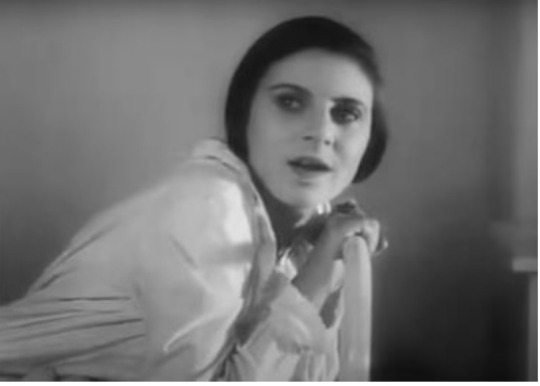
fig. 2
They look at each other and at the teacher as she strolls between the dormitory beds. This is achieved by a succession of long shots of the dormitory and close-ups of the girls looking at each other. The music that accompanies this scene creates a long suspense until the long-awaited kiss (fig. 3).

fig. 3
The film Mädchen in Uniform truly established a genre that would be repeated in cinema, notably through several remakes, including the 1957 version of the same name starring Romy Schneider (Mädchen in Uniform) and the Mexican adaptation Muchachas de Uniforme (1951). The emergence of lesbian desire in a boarding school setting has been a recurring theme in cinema since this pioneering film, with several Hollywood films depicting romantic relationships between young girls in boarding schools.
Pauline
4 notes
·
View notes
Text

Christa Winsloe’s 136th birthday
Happy Birthday, Chris! (23.12.1888, 136 in 2024)
Chris(ta): ✓ writer | playwright | feuilleton writer (famous for the semi-autobiographical film about Manuela titled Mädchen in Uniform (1931), or full (with a lot of changes), the book Das Mädchen Manuela which is known in English as The Child Manuela [READ], ✓ high-level sculptor (famous for animal sculptures), ✓ high-level pencil artist, smart, could crack a joke, ✓ French Resistance member, ✓ pansexual who loved women very much (it all started mainly with a much older cruel fellow school girl at a school in Metz when Chris was 9 (Tina? as own short name since the beginning) . . .
. . . and women and girls love dich decades later (forever and ever) and grateful very, very much.
ALL HAIL, CHRISTA KATE WINSLOE!
PHOTO INFORMATION: USA, 1933 (or maaaybe early 1934.)
PHOTO SOURCE: a now deleted photo which was in one website with paid photos, and it was saved by me 9 years ago (with an instant "magic," the watermark is off, and then text had been added. | Other than that, the photo was edited only by the "official" poster years ago.)
5 notes
·
View notes
Text

Women in menswear :D
(the shirt, at least):
Sybille from (Sylvia und Sybille)
(2023–2024 Dresden State Theatre, modern version of Christa Winsloe's unpublished play of 1931 or so, rewritten by Daniela Löffner.)
Photo: Sebastian Hoppe (Sybille with her beloved girlfriend Sylvia)
(I've been thinking about this from time to time for several weeks, but have decided to check for whom the shirt is made only now.)
Synopsis (read all below and if you like it, please, join shipping with me): modified reality of almost 14 year-old girl* the writer (16 instead) and a friend's Mum.) Fast-paced love story which started as a bond during first meeting. (But Mum's son is in love with the girl (who thinks about him as a friend only) and jealous.) I love it sooo much. If add happy end, then (♡‿♡) Also: real version of this is in Mädchen in Uniform (1931) book Das Mädchen Manuela; because Sylvia is the same Manuela the writer Christa.
*The girl had an older brother (who had a girlfriend) and their Mum died not long ago, but alcoholic father is no help, and the girl blamed him for Mum's death. (In reality, Christa didn't blame father, but his shouting and selfishness led to Katharina Winsloe's death; apart from she needed to do a lot at home after moving in a new house.)
Sybille had a husband who died recently, so it makes her bisexual (hopefully, she had romantic feelings for him, or the marriage was forced by society and it's one big no, and then she isn't bi), but Sylvia is lesbian (in the detailed description of the play, it's said that unlike other teenagers, the greeving girl hadn't had romantic feelings for anybody before Sybille.)
○○○○○
PROOF OF THE SHIRT
(if not to try to understand where the buttons are sewn): either: A. if imagine a shirt as two parts, the top one or a"flap" is left in case of men's shirts | buttoned jackets etc., or B. free space in-between of buttons can be used as a hand warmer, and in case with men's clothes with buttons, right hand can "go in." (I used B too many times to count.) . . .
. . . or . . . (a random picture via Google images)

#women in menswear#LGBTQ#bisexual#WLW#lesbian#Sylvia und Sybille#SySy#shirt#men's clothing#men's shirt#theatre#play#Fanny Staffa#Leonie Hämer#Sybille#original post
2 notes
·
View notes
Note
6 & 21 & 29 for the ask game!
6) A film released before 1970
I think 1970 is the earliest date of any movie in this tournament (The Conformist/Il conformista) and I haven't seen it so I'll maybe sort of cheat and say Girls in Uniform/Mädchen in Uniform (1931) since I have seen that. It was kind of just OK. Really interesting from a historical perspective though! (Film history or queer German history.) It wasn't eligible for the tournament since it's not technically indie but for the sake of being able to answer here, close enough.
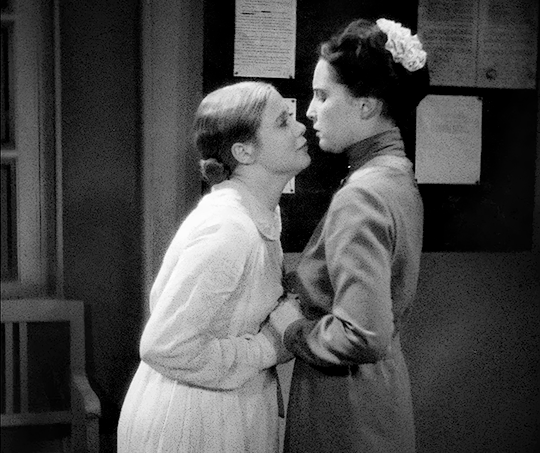
21) A film with a great needledrop/soundtrack/score
I'll be honest, I rarely notice scores, just really bad at auditory processing stuff I think. So I'm sure other people will have a more insightful answer for this question (feel free to comment!) I think I'll go with Hedwig and the Angry Inch though since it's one of my favourite musicals and a really great movie with banger after banger in the album.

29) A film to feel good/uplifted
ooooh good question.... I think it's The Way He Looks/Hoje Eu Quero Voltar Sozinho. Just a really nice, sweet movie.

#saw the animated movies tournament answering these with gifs and i liked that so i'm copying that idea now#asks#not a polls#wong foo is my backup rec for the last question#it's got a bit more heavy stuff in it so i went with the way he looks#but wong foo is still really uplifting and fun
3 notes
·
View notes